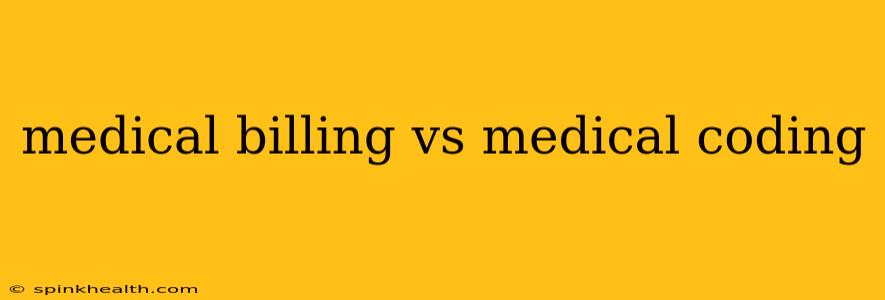The healthcare industry is a complex ecosystem, and behind the scenes, a silent battle for accurate and timely payments rages on. Two crucial roles in this battle are medical billing and medical coding. While often confused, these professions are distinct, yet intricately linked, working together to ensure healthcare providers get paid for their services. Let's delve into the fascinating world of these two career paths and unravel their differences.
Imagine a bustling hospital, filled with the sounds of beeping machines and hurried footsteps. Doctors are diagnosing, nurses are caring, and somewhere amidst the chaos, a crucial process unfolds: translating medical procedures and diagnoses into numerical codes and then transforming those codes into invoices to ensure financial stability. This is where medical billing and coding specialists step in, playing vital, albeit different, roles.
What is Medical Coding?
Medical coding is the process of translating medical diagnoses, procedures, and services into standardized alphanumeric codes. These codes are universal, allowing seamless communication between healthcare providers, insurance companies, and government agencies. Think of it as the language of healthcare finance. Coders use coding systems like ICD-10 (for diagnoses) and CPT (for procedures) to meticulously document every aspect of patient care. This detailed documentation is critical for accurate billing and analysis of healthcare trends.
It's a meticulous job requiring intense focus and a deep understanding of medical terminology and anatomy. A single misplaced digit can lead to delays in payment or even denied claims. Medical coders are the meticulous detail-oriented individuals ensuring everything is perfectly documented.
What skills are needed to be a medical coder?
This section addresses the "People Also Ask" question about skills needed to be a medical coder.
What are the necessary skills for a medical coder? Strong analytical skills are paramount. Coders must accurately interpret medical records and choose the correct codes. Attention to detail is non-negotiable, as even a minor error can have significant consequences. Medical terminology proficiency is crucial for understanding medical reports and selecting the appropriate codes. Knowledge of various coding systems (ICD-10-CM, CPT, HCPCS) is essential for effective coding. Finally, strong computer skills are crucial for using specialized coding software.
What is Medical Billing?
Medical billing is the process of creating and submitting claims to insurance companies and patients to obtain reimbursement for medical services rendered. While coders translate medical information into codes, billers take those codes and transform them into invoices. This involves understanding insurance policies, managing patient accounts, and following up on payments. It's about navigating the complex web of insurance regulations and ensuring timely payment for the provided medical care.
Billers are the financial navigators of the healthcare system. They ensure proper submission of claims, follow up on denials, and manage patient accounts receivable. This often involves interacting with insurance companies, patients, and healthcare providers.
What skills are needed to be a medical biller?
This addresses the implicit "People Also Ask" question about skills needed for medical billing.
What skills are essential for a medical biller? Excellent communication skills are vital, as billers interact with patients, insurance companies, and healthcare providers. A deep understanding of insurance policies, billing procedures, and medical terminology is crucial. Strong organizational and time management skills are essential for managing multiple accounts and deadlines. Proficiency in billing software is necessary for efficient claim processing. Analytical skills are also required to identify and resolve billing issues.
Medical Billing vs. Medical Coding: Key Differences
While both roles are critical to healthcare finance, the core responsibilities differ significantly:
| Feature | Medical Coding | Medical Billing |
|---|---|---|
| Primary Focus | Translating medical information into codes | Submitting claims for reimbursement |
| Key Skills | Medical terminology, anatomy, coding systems | Insurance knowledge, communication, billing software |
| Tools | Coding software, medical dictionaries | Billing software, insurance claim forms |
| Outcome | Accurate medical codes | Timely payment for medical services |
The Synergistic Relationship
Medical billing and coding are intrinsically linked. Accurate coding forms the foundation for successful billing. Without accurate codes, claims are likely to be denied or delayed, impacting the financial health of the healthcare provider. These two roles work in tandem to ensure the smooth flow of payment within the healthcare system.
The Future of Medical Billing and Coding
Technology is rapidly transforming both professions. Electronic Health Records (EHRs) are increasingly automating parts of the coding and billing processes, leading to greater efficiency and accuracy. However, the human element remains crucial. Interpreting complex medical records and navigating the nuances of insurance policies still requires the expertise of skilled professionals.
The healthcare industry is ever-evolving, presenting dynamic challenges and opportunities for both medical billers and coders. The need for accurate and efficient financial management in healthcare ensures that these roles will remain essential for years to come. The detailed work they do, often unseen, is the backbone of the healthcare financial system.

